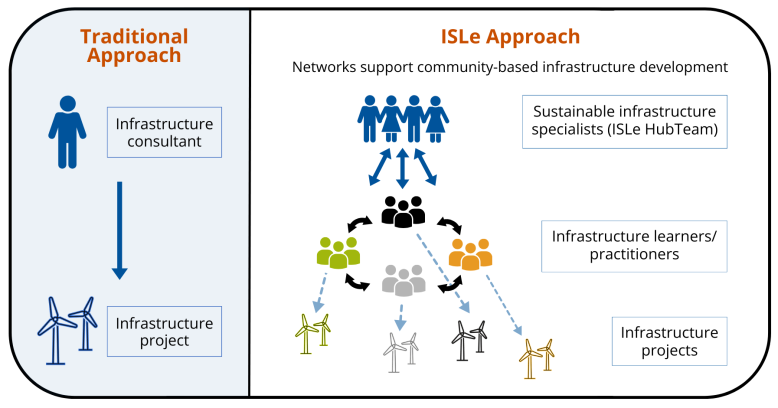ISLe hubs help experts and practitioners build capacity for sustainable and resilient infrastructure by exchanging knowledge and collaborating on solutions.
As infrastructure spending ramps up across the globe, one of the greatest barriers to building in a sustainable and resilient way is a lack of capacity among local government officials, engineers, developers, and financiers. To address this need, the founding partners of the Infrastructure Sustainability Learning (ISLe) Initiative are creating virtual communities of practice for sustainable infrastructure practitioners to learn from experts and from one another.
Objectives of the ISLe Initiative
- Create dedicated learning hubs that focus on addressing critical sustainable infrastructure issues related to particular topics and/or geographies.
- Facilitate knowledge sharing and collaborative problem solving among a diverse group of infrastructure stakeholders utilizing the Project ECHO case-based learning model.
- Develop communities of practice that enable a global discourse on sustainable infrastructure.
The ISLe Model
The ISLe Initiative engages stakeholders from across multiple disciplines in learning hubs, using the case-based and problem-solving learning approaches developed by Project ECHO. Within an ISLe network, participants explore issues related to their own infrastructure projects in collaboration with other practitioners and sustainable infrastructure experts.
Sustainable Infrastructure: Putting Principle into Practice
The ISLe founding partners—the Nicholas Institute, United Nations Environment Programme (UNEP), and the International Coalition for Sustainable Infrastructure (ICSI)—led a yearlong pilot ISLe hub focused on applications of UNEP’s Good Practice Principles for Sustainable Infrastructure. The pilot demonstrated successful adaptation of the Project ECHO model to the sustainable infrastructure field.
Sustainable Infrastructure: Putting Principle into Practice →
Recordings and case study briefs from all sessions are available.
ISLe Hubs
The ISLe model is being extended through development of these new hubs:
- The Sustainable Post-Disaster Rebuilding ISLe Hub will support community leaders implementing post-earthquake rebuilding initiatives in Turkey.
- The Nature-Positive Infrastructure ISLe Hub will equip practitioners to protect, sustainably manage or restore natural or modified ecosystems to address societal challenges, simultaneously benefiting people and the environment.
- The ISLe Learning Hub: Transforming Engineering Education will advance engineering school leaders’ efforts to train the next generation of engineers to holistically integrate climate resilience, emissions reduction, and sustainability into infrastructure design.
Contact Us
If you have questions or comments about the ISLe Initiative, please reach out to sustainable-infrastructure@duke.edu.
ISLe Founding Partners









